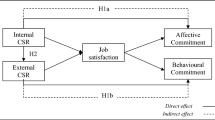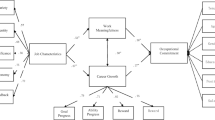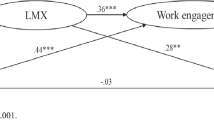Abstract
On-going decreases in average employee tenure and associated increases in turnover necessitate a better understanding for the factors that underlie organizational commitment. CSR initiatives offer a promising avenue for enhancing commitment, while simultaneously improving the overall impact organizations have on their varied stakeholders. Drawing on social identity and P-O fit theories, a moderated mediation model incorporating perceived external prestige and psychosocial development was tested. Data were collected from 333 participants (Mage = 42.65), employed across a variety of industries and levels. Prestige mediated the relationships between various stakeholder-directed contexts of CSR and affective commitment. Furthermore, ego strength was found to moderate the second stage of the mediated effect. The results of this study suggest that the mediating role of prestige is contingent on an employee’s psychosocial development, such that as ego strength increases, prestige becomes a less critical component of the model. Implications, limitations, and opportunities for future study are discussed.

Similar content being viewed by others
Data availability
All relevant data is summarized in the paper. To make the data set publicly accessible, the authors would need to seek approval from their University’s Institutional Review Board for the Projection of Human Subjects but are willing to do so on reasonable request.
References
Aguinis, H., & Glavas, A. (2012). What we know and don’t know about corporate social responsibility: A review and research agenda. Journal of Management, 38, 932–968. https://doi.org/10.1177/0149206311436079.
Ahmad, R., & Islam, T. (2018). Relationships between corporate social responsibility, work engagement and organizational commitment: Explanatory role of organizational identification. Journal of Behavioural Sciences, 28(2), 112–130.
Allen, N. J., & Meyer, J. P. (1990). The measurement and antecedents of affective, continuance and normative commitment to the organization. Journal of Occupational Psychology, 63, 1–18. https://doi.org/10.1111/j.2044-8325.1990.tb00506.x.
Baltes, P. B., Reese, H. W., & Lipsitt, L. P. (1980). Life-span developmental psychology. Annual Review of Psychology, 31(1), 65–110. https://doi.org/10.1146/psych.1980.31.issue-1.
Baron, R. M., & Kenny, D. A. (1986). The moderator-mediator variable distinction in social psychological research: Conceptual, strategic, and statistical considerations. Journal of Personality and Social Psychology, 51, 1173–1182. https://doi.org/10.1037/0022-3514.51.6.1173.
Bohlmann, C., Krumbholz, L., & Zacher, H. (2018). The triple bottom line and organizational attractiveness ratings: The role of pro-environmental attitude. Corporate Social Responsibility and Environmental Management, 25, 912–919. https://doi.org/10.1002/csr.1507.
Brammer, S., Millington, A., & Rayton, B. (2007). The contribution of corporate social responsibility to organizational commitment. International Journal of Human Resource Management, 18, 1701–1719. https://doi.org/10.1080/09585190701570866.
Buhrmester, M., Kwang, T., & Gosling, S. D. (2011). Amazon’s Mechanical Turk: A new source of inexpensive, yet high-quality, data? Perspectives on Psychological Science, 6(1), 3–5. https://doi.org/10.1177/1745691610393980
Carmeli, A. (2005). Perceived external prestige, affective commitment, and citizenship behaviors. Organization Studies, 26, 443–464. https://doi.org/10.1177/0170840605050875.
Carmeli, A., & Freund, A. (2002). The relationship between work and workplace attitudes and perceived external prestige. Corporate Reputation Review, 5(1), 51–68. https://doi.org/10.1057/palgrave.crr.1540164.
Carmeli, A., & Freund, A. (2004). Work commitment, job satisfaction, and job performance: An empirical investigation. International Journal of Organization Theory and Behavior, 6, 289–309. https://doi.org/10.1108/ijotb-07-03-2004-b001.
Carmeli, A., & Freund, A. (2009). Linking perceived external prestige and intentions to leave the organization: The mediating role of job satisfaction and affective commitment. Journal of Social Service Research, 35, 236–250. https://doi.org/10.1080/01488370902900873.
Carstensen, L. L. (1992). Social and emotional patterns in adulthood: Support for socioemotional selectivity theory. Psychology and Aging, 7, 331–338. https://doi.org/10.1037/0882-7974.7.3.331.
Catano, V. M., & Hines, H. M. (2016). The influence of corporate social responsibility, psychologically healthy workplaces, and individual values in attracting millennial job applicants. Canadian Journal of Behavioural Science, 48(2), 142–154. https://doi.org/10.1037/cbs0000036.
Collen, H. (2019). The relationships of contextual performance with person-organization fit, perceived organizational prestige and organizational identity strength: The mediating role of organizational commitment. European Journal of Multidisciplinary Studies, 4(2), 28. https://doi.org/10.26417/ejms-2019.v4i2-536.
Costanza, D. P., & Finkelstein, L. M. (2015). Generationally based differences in the workplace: Is there a there there? Industrial and Organizational Psychology, 8, 308–323. https://doi.org/10.1017/iop.2015.15.
Desimone, J. A., Harms, P. D., & Desimone, A. J. (2015). Best practice recommendations for data screening. Journal of Organizational Behavior, 36, 171–181. https://doi.org/10.1002/job.1962.
Ditlev-Simonsen, C. D., & Midttun, A. (2011). What motivates managers to pursue corporate responsibility? A survey among key stakeholders. Corporate Social Responsibility and Environmental Management, 18(1), 25–38. https://doi.org/10.1002/csr.237.
Dow, G. T., & Mayer, R. E. (2004). Teaching students to solve insight problems: Evidence for domain specificity in creativity training. Creativity Research Journal, 16, 389–398. https://doi.org/10.1080/10400410409534550.
Dutton, J. E., Dukerich, J. M., & Harquail, C. V. (1994). Organizational images and member identification. Administrative Science Quarterly, 39, 239–263. https://doi.org/10.2307/2393235.
Edwards, M. R., & Kudret, S. (2017). Multi-foci CSR perceptions, procedural justice and in-role employee performance: The mediating role of commitment and pride. Human Resource Management Journal, 27(1), 169–188. https://doi.org/10.1111/1748-8583.12140.
El Akremi, A., Gond, J. P., Swaen, V., De Roeck, K., & Igalens, J. (2018). How do employees perceive corporate responsibility? Development and validation of a multidimensional corporate stakeholder responsibility scale. Journal of Management, 44, 619–657. https://doi.org/10.1177/0149206315569311.
Erikson, E. H. (1950). Childhood and society. Norton.
Erikson, E. H. (1968). Identity: Youth and crisis. Norton.
Farooq, O., Payaud, M., Merunka, D., & Valette-Florence, P. (2014). The impact of corporate social responsibility on organizational commitment: Exploring multiple mediation mechanisms. Journal of Business Ethics, 125, 563–580. https://doi.org/10.1007/s10551-013-1928-3.
Farooq, O., Rupp, D. E., & Farooq, M. (2017). The multiple pathways through which internal and external corporate social responsibility influence organizational identification and multifoci outcomes: The moderating role of cultural and social orientations. Academy of Management Journal, 60, 954–985. https://doi.org/10.5465/amj.2014.0849.
Gao, Y., & He, W. (2017). Corporate social responsibility and employee organizational citizenship behavior: The pivotal roles of ethical leadership and organizational justice. Management Decision, 55, 294–309. https://doi.org/10.1108/MD-05-2016-0284.
Haski-Leventhal, D., Pournader, M., & McKinnon, A. (2017). The role of gender and age in business students’ values, CSR attitudes, and responsible management education: Learnings from the PRME international survey. Journal of Business Ethics, 146(1), 219–239. https://doi.org/10.1007/s10551-015-2936-2.
Hayes, A. F. (2009). Beyond Baron and Kenny: Statistical mediation analysis in the new millennium. Communication Monographs, 76, 408–420. https://doi.org/10.1080/03637750903310360.
Hayes, A. F. (2018). Introduction to mediation, moderation, and conditional process analysis (2nd ed.). The Guilford Press.
Heckhausen, J., Wrosch, C., & Schulz, R. (2010). A motivational theory of life-span development. Psychological Review, 117(1), 32–60. https://doi.org/10.1037/a0017668.
Holme, R., & Watts, P. (2001). Making good business sense. The Journal of Corporate Citizenship, 2001(2), 17–20. https://doi.org/10.9774/gleaf.4700.2001.su.00005.
Iverson, R. D., & Buttigieg, D. M. (1999). Affective, normative and continuance commitment: Can the “right kind” of commitment be managed? Journal of Management Studies, 36, 307–333. https://doi.org/10.1111/1467-6486.00138.
Kim, B. J., Nurunnabi, M., Kim, T. H., & Jung, S. Y. (2018). The influence of corporate social responsibility on organizational commitment: The sequential mediating effect of meaningfulness of work and perceived organizational support. Sustainability, 10, Article: 2208. https://doi.org/10.3390/su10072208
Kim, H. R., Lee, M., Lee, H. T., & Kim, N. M. (2010). Corporate social responsibility and employee-company identification. Journal of Business Ethics, 95, 557–569. https://doi.org/10.1007/s10551-010-0440-2.
Klimkiewicz, K., & Oltra, V. (2017). Does CSR enhance employer attractiveness? The role of millennial job seekers’ attitudes. Corporate Social Responsibility and Environmental Management, 24, 449–463. https://doi.org/10.1002/csr.1419.
Kristof, A. L. (1996). Person-organization fit: An integrative review of its conceptualizations, measurement, and implications. Personnel Psychology, 49(1), 1–49. https://doi.org/10.1111/j.1744-6570.1996.tb01790.x
Luz, C. M. D. R., de Paula, S. L., & de Oliveira, L. M. B. (2018). Organizational commitment, job satisfaction and their possible influences on intent to turnover. Revista de Gestão, 25(1), 84–101. https://doi.org/10.1108/REGE-12-2017-008.
Mael, F., & Ashforth, B. E. (1992). Alumni and their alma mater: A partial test of the reformulated model of organizational identification. Journal of Organizational Behavior, 13, 103–123. https://doi.org/10.1002/job.4030130202.
March, J. G., & Simon, H. A. (1958). Organizations. Blackwell Publishing Inc.
Marcia, J. E. (2002). Identity and psychosocial development in adulthood. Identity, 2(1), 7–28. https://doi.org/10.1207/s1532706xid0201_02.
Markstrom, C. A., Sabino, V. M., Turner, B. J., & Berman, R. C. (1997). The psychosocial inventory of ego strengths: Development and validation of a new Eriksonian measure. Journal of Youth and Adolescence, 26, 705–732. https://doi.org/10.1023/a:1022348709532.
Mason, W., & Suri, S. (2012). Conducting behavioral research on Amazon’s Mechanical Turk. Behavior Research Methods, 44(1), 1–23. https://doi.org/10.3758/s13428-011-0124-6.
Maxwell, S. E., Cole, D. A., & Mitchell, M. A. (2011). Bias in cross-sectional mediation: Partial and complete mediation under an autoregressive model. Multivariate Behavioral Research, 46(5), 816–841. https://doi.org/10.1080/00273171.2011.606716.
Meyer, J. P., & Allen, N. J. (1991). A three-component conceptualization of organizational commitment. Human Resource Management Review, 1(1), 61–89. https://doi.org/10.1016/1053-4822(91)90011-Z.
Meyer, J. P., Allen, N. J., & Smith, C. A. (1993). Commitment to organizations and occupations: Extension and test of a three-component conceptualization. Journal of Applied Psychology, 78, 538–551. https://doi.org/10.1037/0021-9010.78.4.538.
Meyer, J. P., Stanley, D. J., Herscovitch, L., & Topolnytsky, L. (2002). Affective, continuance, and normative commitment to the organization: A meta-analysis of antecedents, correlates, and consequences. Journal of Vocational Behavior, 61(1), 20–52. https://doi.org/10.1006/jvbe.2001.1842.
Mikolajek-Gocejna, M. (2016). The relationship between corporate social responsibility and corporate financial performance - Evidence from empirical studies. Comparative Economic Research, 19(4), 67–84. https://doi.org/10.1515/cer-2016-0030.
Mowday, R. T., Porter, L. W., & Steers, R. M. (1982). Employee-organization linkages: The psychology of commitment, absenteeism, and turnover. Academic.
Mueller, K., Hattrup, K., Spiess, S. O., & Lin-Hi, N. (2012). The effects of corporate social responsibility on employees’ affective commitment: A cross-cultural investigation. Journal of Applied Psychology, 97, 1186–1200. https://doi.org/10.1037/a0030204.
Ng, T. W. H., Yam, K. C., & Aguinis, H. (2019). Employee perceptions of corporate social responsibility: Effects on pride, embeddedness, and turnover. Personnel Psychology, 72(1), 107–137. https://doi.org/10.1111/peps.12294.
Ochse, R., & Plug, C. (1986). Cross-cultural investigation of the validity of Erikson’s theory of personality development. Journal of Personality and Social Psychology, 50, 1240–1252. https://doi.org/10.1037/0022-3514.50.6.1240.
Podsakoff, P. M., MacKenzie, S. B., Lee, J. Y., & Podsakoff, N. P. (2003). Common method biases in behavioral tesearch: A critical review of the literature and recommended remedies. Journal of Applied Psychology, 88, 879–903. https://doi.org/10.1037/0021-9010.88.5.879.
Rudolph, C. W., Rauvola, R. S., & Zacher, H. (2018). Leadership and generations at work: A critical review. Leadership Quarterly, 29(1), 44–57. https://doi.org/10.1016/j.leaqua.2017.09.004.
Smidts, A., Pruyn, A. T. H., & Van Riel, C. B. M. (2001). The impact of employee communication and perceived external prestige on organizational identification. Academy of Management Journal, 44, 1051–1062. https://doi.org/10.5465/3069448.
Sobel, M. E. (1982). Asymptotic confidence intervals for indirect effects in structural equation models. In S. Leinhart (Ed.), Sociological Methodology (pp. 290–312). Jossey-Bass. https://doi.org/10.2307/270723
Sobel, M. E. (1986). Some new results on indirect effects and their standard errors in covariance structure models. In N. Tuma (Ed.), Sociological Methodology (Vol. 16, pp. 159–186). American Sociological Association. https://doi.org/10.2307/270922
Sokol, J. T. (2009). Identity development throughout the lifetime: An examination of Eriksonian Theory. Graduate Journal of Counseling Psychology, 1(2), 14. https://epublications.marquette.edu/gjcp/vol1/iss2/14. Accessed 29 Apr 2022
Story, J., Castanheira, F., & Hartig, S. (2016). Corporate social responsibility and organizational attractiveness: Implications for talent management. Social Responsibility Journal, 12, 484–505. https://doi.org/10.1108/SRJ-07-2015-0095.
Supanti, D., & Butcher, K. (2019). Is corporate social responsibility (CSR) participation the pathway to foster meaningful work and helping behavior for millennials? International Journal of Hospitality Management, 77, 8–18. https://doi.org/10.1016/j.ijhm.2018.06.001.
Tajfel, H., & Turner, J. (1979). An integrative theory of intergroup conflict. In M. J. Hatch, & M. Schultz (Eds.), Organizational Identity, A Reader (pp. 56–65). Oxford University Press.
Turker, D. (2009). How corporate social responsibility influences organizational commitment. Journal of Business Ethics, 89, 189–204. https://doi.org/10.1007/s10551-008-9993-8.
Udir Mišič, K., & Podnar, K. (2019). Perception of city management, fellow residents, and perceived external prestige (PEP) as antecedents of city affective commitment - The city marketing perspective. Cities, 84, 66–74. https://doi.org/10.1016/j.cities.2018.04.016.
Wang, H., Tong, L., Takeuchi, R., & George, G. (2016). Corporate social responsibility: An overview and new research directions. Academy of Management Journal, 59, 534–544. https://doi.org/10.5465/amj.2016.5001.
Waples, C. J., & Brachle, B. J. (2020). Recruiting millennials: Exploring the impact of CSR involvement and pay signaling on organizational attractiveness. Corporate Social Responsibility and Environmental Management, 27, 870–880. https://doi.org/10.1002/csr.1851.
Wong, I. K. A., & Gao, J. H. (2014). Exploring the direct and indirect effects of CSR on organizational commitment: The mediating role of corporate culture. International Journal of Contemporary Hospitality Management, 26, 500–525. https://doi.org/10.1108/IJCHM-05-2013-0225.
Zacher, H. (2015). Using lifespan developmental theory and methods as a viable alternative to the study of generational differences at work. Industrial and Organizational Psychology, 8, 342–346. https://doi.org/10.1017/iop.2015.47.
Zafar, M., & Ali, I. (2016). The influence of corporate social responsibility on employee commitment: The mediating role of employee company identification. Asian Social Science, 12, 262–280. https://doi.org/10.5539/ass.v12n12p262.
Author information
Authors and Affiliations
Corresponding author
Ethics declarations
Ethics approval
The questionnaires and methodology for this study were approved by the Institutional Review Board for the Protection of Human Subjects at the University with which all authors are affiliated (IRB Number: #071720-1) and adhere to conventional ethical standards (e.g., the Belmont Report, the Declaration of Helsinki).
Consent to participate and publish
Informed consent was obtained from all individual participants included in the study. No personally identifying information was collected and all participants consented to the possibility that the data collected could be published in a research journal.
Conflict of interest
The authors have no relevant financial or non-financial interests to disclose nor any conflicts of interest to declare that are relevant to the content of this article. All authors certify that they have no affiliations with or involvement in any organization or entity with any financial interest or non-financial interest in the subject matter or materials discussed in this manuscript. The authors have no financial or proprietary interests in any material discussed in this article. All funding for participant inducement was sourced internally from faculty discretionary research funds (approximately $500).
Additional information
Publisher’s note
Springer Nature remains neutral with regard to jurisdictional claims in published maps and institutional affiliations.
Supplementary Information
Below is the link to the electronic supplementary material.
ESM 1
(DOCX 38.7 KB)
Rights and permissions
Springer Nature or its licensor (e.g. a society or other partner) holds exclusive rights to this article under a publishing agreement with the author(s) or other rightsholder(s); author self-archiving of the accepted manuscript version of this article is solely governed by the terms of such publishing agreement and applicable law.
About this article
Cite this article
Brachle, B.J., Waples, C.J. CSR and affective organizational commitment: a moderated mediation model exploring the roles of prestige and psychosocial development. Curr Psychol 42, 29435–29447 (2023). https://doi.org/10.1007/s12144-022-03970-7
Accepted:
Published:
Issue Date:
DOI: https://doi.org/10.1007/s12144-022-03970-7




